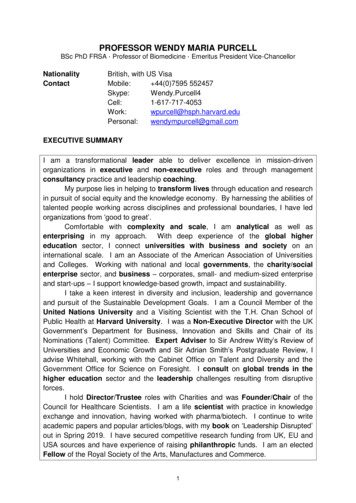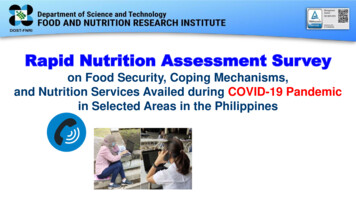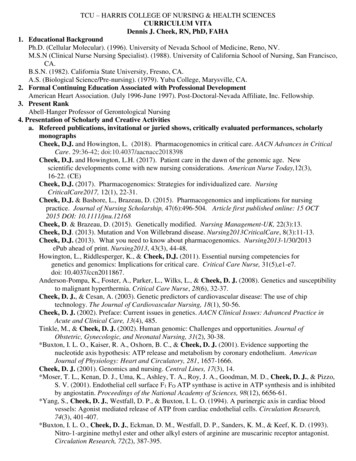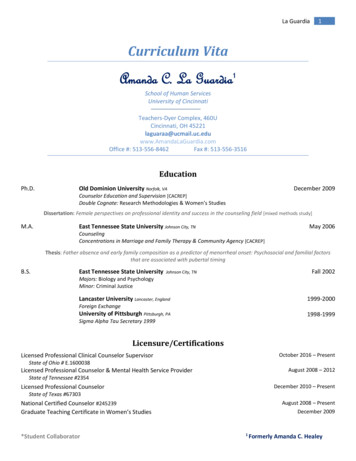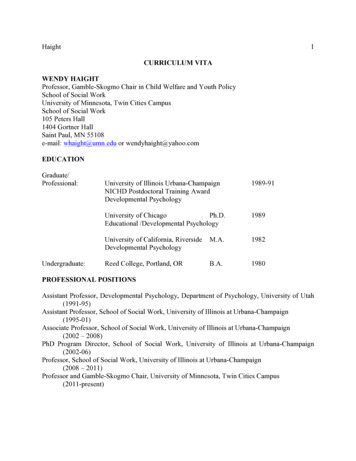
Transcription
Haight1CURRICULUM VITAWENDY HAIGHTProfessor, Gamble-Skogmo Chair in Child Welfare and Youth PolicySchool of Social WorkUniversity of Minnesota, Twin Cities CampusSchool of Social Work105 Peters Hall1404 Gortner HallSaint Paul, MN 55108e-mail: whaight@umn.edu or l:Undergraduate:University of Illinois Urbana-ChampaignNICHD Postdoctoral Training AwardDevelopmental Psychology1989-91University of ChicagoPh.D.Educational /Developmental Psychology1989University of California, RiversideDevelopmental PsychologyM.A.1982Reed College, Portland, ORB.A.1980PROFESSIONAL POSITIONSAssistant Professor, Developmental Psychology, Department of Psychology, University of Utah(1991-95)Assistant Professor, School of Social Work, University of Illinois at Urbana-Champaign(1995-01)Associate Professor, School of Social Work, University of Illinois at Urbana-Champaign(2002 – 2008)PhD Program Director, School of Social Work, University of Illinois at Urbana-Champaign(2002-06)Professor, School of Social Work, University of Illinois at Urbana-Champaign(2008 – 2011)Professor and Gamble-Skogmo Chair, University of Minnesota, Twin Cities Campus(2011-present)
Haight2SELECTED AWARDS AND HONORSPhi Beta Kappa, Reed College, 1980.Helen B. Walberg Prize for Scholarly Distinction, University of Chicago, 1988.The Marjorie Monkman Research Award, School of Social Work University of Illinois, 1997, 1999.Arnold O. Beckman Award for significant and original research, University of Illinois Research Board,2004Faculty Fellow: Center for Children and Family Research, 2006-2011.Campus incomplete list of teachers voted as excellent by their students, multiple listings 1995-2010.Associate: Center for Advanced Study, University of Illinois, 2010-2011.Marty and Jack Rossmann Award for creativity in research, teaching and service, 2016.PROFESSIONAL ACTIVITIESProfessional and Learned SocietiesNational Association of Social WorkersCouncil on Social Work EducationSociety for Social Work ResearchEditorships or Journal ReviewerMember, Editorial Board, Social Work, Child and Youth Services ReviewConsulting Editor, Social DevelopmentAd hoc reviewer for Social Service Review, Developmental Psychology, Child Development, HumanDevelopment, Child Welfare, Journal of Adolescent Research, Journal of Early Adolescent Research,Social Work, Child and Youth Services Review.University Service - University of Illinois at Urbana-ChampaignMember, Health and Wellness Steering CommitteeMember, Campus Committee on Faculty Excellence ProgramMember, Stewarding excellence, small unit review committee (2009-2010)Committees - School of Social Work, University of Illinois at Urbana-ChampaignChair of Human Subjects Committee, School of Social Work (1996 – 1999)Member of Executive Committee, School of Social Work (1996 – 1998, 2002-2004, 2009-2010)Member of the Doctoral Committee, School of Social Work (1997 – 2008)Diversity Committee, School of Social Work (1999-2000, chair, member, 2009-present)Member MSW curriculum committee (2007-2008)Member, Schools Specialization Committee (1996-present)Children and Family Research Center Executive Committee (2005-present)Chair, BSW research curriculum committee (2009-present)Chair, Executive Committee (2009-2011)Committees- University of Minnesota Twin Cities
Haight3College of Education and Human Development Tenure and Promotion Review Committee (2012-2016)Chair Research Committee (2012-2014)Member/Chair Research committee (2014-present)Faculty Search Committee (2014-2015)Member PhD Committee (2012-present)GRANTS AND CONTRACTSDissertation-Year Fellowship. Spencer Foundation, ( 12,000.00). 1987-88.Parent-toddler pretend and physical play. Spencer Foundation ( 7,500.00). 1990-91 (Co-PI: RossParke).The role of play in mother-child conflict talk. University Research Board, University of Utah( 5,000.00). 1991-93.Pretending in four cultural communities. Spencer Foundation ( 220,000.00) 1991-94.The socialization of African-American children at church. National Academy of Education, PostDoctoral Fellowship. ( 35,000.00). 1993-95.The role of parent-child pretend play in peer play, Spencer Foundation ( 11,058.00). 1997.A longitudinal study of the role of mentors in the psychosocial development of foster your. Children andFamily Research Center, University of IL ( 13,994.00). 1997 (Co-PI: Jean Rhodes).Guidelines for supervising visitations between parents and their infants and young children. Childrenand Family Research Center UIUC. ( 11, 395.59) 1997.Describing parent-child interactions during foster care visits. Children and Family Research Center,UIUC. ( 22, 695.00) 1997.Supporting parents and their young children during foster care visits. Children and Family ResearchCenter UIUC. ( 21,570.00). 1998. (CO-PIs: Sarah Mangelsdorf & James Black).Supporting the parenting of battered women with children in foster care, Children and Family ResearchCenter UIUC. ( 25,000.00) 1999-01Supporting the relationships of children in foster care and their parents: Perspectives of foster parentsand parents. Children and Family Research Center, UIUC. ( 30,000.00). 1999-01 (Co PI: James Black).Achieving permanency for children in families experiencing domestic violence, Children and FamilyResearch Center, UIUC. ( 25,000.00). 2000-02 (Co-PI Woochan Shim).
Haight4Supporting children’s recovery from parental methamphetamine abuse, University of Illinois ResearchBoard ( 21,481.00). 2004-05. (Co-PIs: Teresa Ostler and James Black). (This grant received the ArnoldO. Beckman Award for significant and original research.).Supporting children’s recovery from parent methamphetamine abuse: Mental health interventionand assessment for traumatized children, Illinois Department of Children and Family Services.( 115,579.00). 2005-2006 (Co-PIs: Teresa Ostler, James Black).Supporting children’s recovery from parent methamphetamine abuse: Mental health interventionand assessment for traumatized children. Illinois Department of Children and Family Services,2006-2007. ( 154,369.00). 2006-07 (Co-PIs: Teresa Ostler, James Black).Rural methamphetamine-abusing parents, NIDA. R21. ( 450,000.00) (Co-PIs: James Black,Jennifer Greene, Sydney Hans) 2007-2010.Supporting the development of pregnant and parenting teens. Illinois Department of Human Services.( 135,450.00) 2008-2011.The sociocultural construction of out-of-school suspensions in suburban communities: Experiences ofAfrican American children, their parents, and educators. The University Metropolitan ConsortiumMetropolitan Research Grant Program. ( 100,000.00). (Co-PIs: Priscilla Gibson and Misa Kayama.)2011-2012.The sociocultural construction of out of-school suspensions in urban communities: Experiences ofAfrican American children, their parents, and educators. Spencer Foundation. 39,000.00. (Co-PIs:Priscilla Gibson and Misa Kayama.) 2011-2012A mixed method evaluation of the cross over youth practice model. Casey Family Program.(Approximately 80,000.00). (Co-PI Laurel Bidwell) 2012-2014.A mixed method evaluation of the parent representation clinic. Casey Family Program. (Approximately 50,000.) 2013-2014.International travel grant. GPS alliance. University of Minnesota. (2013-2014). (CO-PI: PriscillaGibson). 4, 082.00Disability, Stigma and School. Spencer Foundation. (CO-PIs: Priscilla Gibson, Misa Kayama). 49,925.00. 2014-2015Educating students to be allies with issues of oppression and social justice. MulticulturalResearch Award. Institute on Diversity, Equity and Advocacy (IDEA). University of Minnesota.(PI: Priscilla Gibson). 4,000.00. 2014.The out-of-school suspension of Black girls in Minnesota: Risk and protective processesGrant –In-Aid, University of Minnesota, 31, 288.00. 2017-2018.
Haight5Gamble-Skogmo and Title IV-E funding. 964,965.00. 2011-2017PUBLICATIONSBooksHaight, W. and Miller, P. (1993). Pretending at home: Development in Sociocultural Context. Albany:State University of New York Press. (Translated into Japanese).Haight, W. (2002). The Socialization of African - American Children at Church: A SocioculturalPerspective. New York: Cambridge University Press.Hudley, E., Haight, W., Miller, P. (2003, 2009). Raise up a child: Human development in anAfrican-American family. Chicago: Lyceum Press.Haight, W. and Taylor, E. (2007). Human behavior for social work practice: Adevelopmental-ecological perspective. Chicago: Lyceum Press.Haight, W., Ostler, T., Black, J. and Kingery, L. (2009). Children of MethamphetamineInvolved Families: The Case of Rural Illinois. New York: Oxford University Press.Bamba, S. and Haight, W. (2011). Child Welfare and Development: A Japanese Case Study.New York: Cambridge University Press.Haight, W. and Taylor, E. (2013). Human behavior for social work practice: Adevelopmental-ecological perspective. Second Edition. Chicago: Lyceum Press.Kayama, M. and Haight, W. (2014). Development and Disability: A Japanese Case Study. New York:Oxford University Press.Haight, W. and Bidwell, L. (2016). Mixed methods research for social work: Integration ofmethodologies to enhance practice and policy. Chicago: Lyceum Press.Haight, W., Kayama, M., Ku, M., Cho, M. & Lee, H. (under contract). Disability, Stigma andchildren’s developing selves: Insights from Japan, South Korea, Taiwan and the US.New York: Oxford University Press.Chapters in Books
Haight6Haight, W. (1994). The pretend play of European-American children in sociocultural context.In Wertsch, J., Rio, Pablo del and Alvarez, A. (Eds.) Conference for socio-cultural Research:Volume 4.Haight, W. (1998). A sociocultural perspective on parent-child pretend play. In D. Fromberg andD. Bergen (Eds.) Play from birth to twelve: Contexts, perspectives, and meanings. NewYork: Garland Press.Haight, W. (1999). Religious development. In C. Smith (Ed.) The encyclopedia of parenting.Greenwood Publishing.Haight, W. (1999). The pragmatics of caregiver-child pretending at home: Understandingculturally specific socialization practices. In A. Goncu (Ed.) Children's engagement in theworld: A sociocultural perspective. Cambridge: Cambridge University Press.Haight, W. (1999). Gathering the spirit at First Baptist Church: Spirituality as a protective factorin the lives of African American children. In C. Davis (Ed). Multicultural issues in SocialWork, Volume II. Washington, DC: NASW Press.Haight, W. (2004). A Sociocultural Perspective on Children’s Spiritual Development. In D.Ratcliff (Ed.) Children’s Spirituality: Christian Perspectives, Research, and Applications.Cascade Books.Haight, W. & Carter-Black, J. (2004). His eye is on the sparrow: Teaching and learning in anAfrican-American community. In E. Gregory, S. Long and D. Volk (Eds.) Many pathways toliteracy: Learning with Peers, Siblings, Grandparents and in Community Settings. London:Routledge Falmer.Haight, W. (2006). A sociocultural perspective of parent-child pretend play. In D. Fromberg andD. Bergen (Eds.) Play from birth to twelve: Contexts, perspectives, and meanings. SecondEdition. New York: Garland Press.Haight, W., Black, J., Jacobsen, T. & Sheridan, K. (2006). Pretend Play and Emotion Learning inTraumatized Mothers and Children,” In D. Singer, R. Michnick Golinkoff, and K. HirshPasek (Eds.) Play Learning. New York: Oxford University Press.Gaskins, S., Haight, W. & Lancy, D. (2007). The cultural construction of play. In S.Gaskins & A. Goncu (Eds.) Play and Development: Evolutionary, sociocultural, and functionalperspectives. New Jersey: Lawrence Erlbaum Associates.Haight, W. (2009) Imagining each other: An African American grandmother combats racial hatred. InR. Shweder (Ed.-in-chief), The Chicago Companion to the Child. Chicago: University of ChicagoPress.Greene, J., Sommerfeld, P. & Haight, W. (2010). Combining methods in social work research:
Haight7Fusing or Fragmenting? In I. Shaw, B. Briar-Lawson, J. Orme & R.Ruckdeschel (Eds.)Sage Handbook of Social Work Research. London: Sage publications.Ostler, T. and Haight, W. (2010). Viewing young foster children’s responses to visits through thelens of maternal containment: Implications for attachment disorganization. In J. Solomonand C. George (Eds.) Attachment Disorganization, 2nd edition. Guilford Press.Haight, W. & Cho, M. (2015). The cultural and familial contexts of caregiver support forchildren’s pretend play. In D. Fromberg & D. Bergen (Eds.) Play from Birth to Twelve:Contexts, perspectives, and meanings.Third edition. New York: Routledge.Haight, W. & Gibson, P. (2016). Out of school suspensions of African American Youth andProgressive Education Alternatives. In T. Allen (Ed.) Encyclopedia of Social Work.Oxford University Press.Peer Reviewed Journal ArticlesHaight, W., Black, J. & DiMatteo, M.R. (1985). Young children's understanding of the socialroles of physician and patient. Journal of Pediatric Psychology, 10, 31-43.Huttenlocher, J., Haight, W., Seltzer, M., Bryk, A. & Lyons, T. (1991). Early vocabularygrowth: Relation to language input and gender. Developmental Psychology, 27(2), 236-248.Haight, W. and Miller, P. (1992). The development of everyday pretend play: A longitudinalstudy of mothers' participation. Merrill-Palmer-Quarterly, 38, 331-349.Haight, W., Masiello, T., Dickson, L., Huckeby, E. & Black, J. (1994). The everyday contextsand social functions of spontaneous mother-child pretend play in the home. Merrill-PalmerQuarterly, 40, 509-522.Haight, W. & Sachs, K. (1995). A longitudinal study of the enactment of negative emotionduring mother-child pretend play from 1-4 years. In L. Sperry and P. Smiley (Eds.)Developmental dimensions of self and other. W. Damon (Series Editor). New Directions inChild Development.Haight, W., Garvey, C. and Masiello, T. (1995). Varieties of mother-child Conflict in the home.Social Development, 4, 92-107.Haight, W., Parke, R. and Black, J. (1997). Mothers' and fathers' beliefs about and participationin their toddlers' pretend play. Merrill-Palmer Quarterly, 43, 271-290.Haight, W. (1998). Gathering the spirit: Spiritual socialization as a protective factor in the livesof African American Children. Social Work, 43, 213 – 222. (Nominated for best researcharticle of 1998 awarded by the Society for Social Work Research).
Haight8Haight, W., Carpenter, B. & Tata, L. (1999). Supporting young children's peer relationships:Broadening our uses of pretend play in social work interventions. School Social WorkJournal, 24, 15-28.Haight, W., Fung, H., Wang, X., Williams, K. & Mintz, J. (1999). Universal, developmentaland variable aspects of young children’s play: A cross-cultural comparison of pretending athome. Child Development, 70, 1477-1488.Rhodes, J. Haight, W. & Briggs, E. (1999). The influence of mentoring on the peer relationshipsof foster youth in relative and nonrelative care. Journal of Research on Adolescence, 9(2),185 – 201.Haight, W., Black, J., Workman, C. & Tata, L. (2001). Parent-child interaction during foster carevisits: Implications for practice. Social Work, 46, 325-340.Haight, W., Rhodes, J., & Nicholson, M. (2001). Cross-race mentoring: perspectives of mentorsover time and strategies for support. The Mentor: Journal of Mentoring and FieldExperience, 1, 8-17.Haight, W., Mangelsdorf, S., Black, J., Giorgio. G., Tata, L., & Shoppe, S. (2002). Perspectivesof parents, foster parents and child welfare workers of parent visits. Child Welfare, LXXXI, 2,173-202.Haight, W., Kagle, J. and Black, J. (2002). Understanding and supporting parent-childrelationships during foster care visits: Implications of attachment theory and research. SocialWork, 48, 195-208.Haight, W., Jacobsen, T., Black, J.E., Kingery, L., Sheridan, K. & Mulder, C. (2005). In thesebleak days: Parent methamphetamine abuse and child welfare in the rural Midwest. Childrenand Youth Services Review, 27, 949-971.Haight, W., Mangelsdorf, S., Black, J., Szewczyk, M., Schoppe, S., Giorgio, G., Madrigal, K.and Tata, L. (2005). Enhancing parent-child interaction during foster care visits:Experimental assessment of an intervention. Child Welfare, 84, 459-481.Shim, W. & Haight, W. (2006). Supporting battered women and their children: Perspectives ofbattered mothers and child welfare professionals. Children and Youth Services Review, 28,620-637.Black, J., Haight, W. & Ostler, T. (2006). Health and psychiatric issues of children ofmethamphetamine abusers and manufacturers. Psychiatric Times, 23(14), 18-19.Haight, W., Ostler, T., Black, J., Sheridan, K. & Kingery, L. (2007). A child’s eye view of parentmethamphetamine abuse: Implications for helping foster families to succeed. Children andYouth Services Review, 29(1), 1-15.
Haight9Bamba, S. & Haight, W. (2007). Helping maltreated children to find their Ibasho: Japaneseperspectives on supporting the well-being of children in state care. Children and YouthServices Review, 29(4), 405-427.Ostler, T., Haight, W. & Black, J. (2007). Mental health outcomes and perspectives of ruralchildren raised by parent who abuse methamphetamine. Journal of American Academy ofChild and Adolescent Psychiatry, 46(4), 500-507.Schoppe-Sullivan, S., Mangelsdorf, S., Haight, W., Black, J., Sokolowski, M., Giorgio, G. &Tata, L. (2007). Maternal discourse, attachment-related risk, and current risk factors:Associations with maternal parenting behavior during foster care visits. Journal of AppliedDevelopmental Psychology, 28(2), 149-165.Haight, W., Shim, W. & Linn, L. (2007) Mothers’ strategies for protecting children frombatterers: The perspectives of battered women involved in child protective services. ChildWelfare, 86(4), 41-62.Haight, W., Carter-Black, J. & Sheridan, K. (2009) Mothers’ Experience ofMethamphetamine Addiction: A Case-based Analysis of Rural, Midwestern Women.Children and Youth Services Review, 31, 71-77.Bamba, S. & Haight, H. (2009a). The developmental-ecological approach of Japanese childwelfare professionals to supporting children’s social and emotional well-being: Thepractice of mimamori. Children and Youth Services Review,31, 429-439.Bamba, S. & Haight, W. (2009b). Maltreated children’s emerging well-being in Japanese statecare. Children and Youth Services Review, 31, 797-806.Haight, W., Finet, D., Bamba, S., & Helton, J. (2009). The beliefs of resilient African-Americanadolescent mothers transitioning from foster care to independent living: A case-basedanalysis. Children and Youth Services Review. Vol. 31, 53-62.Haight, W. (2010). The Multiple Roles of Applied Social Science Research in Evidenceinformed Practice. Guest editorial, Social Work, 55(2),101-104.Haight, W., Black, J. & Sheridan, K. (2010). A mental health intervention for rural, fosterchildren from methamphetamine-involved families: Experimental assessment withqualitative elaboration. Children and Youth Services Review, 32(10), 1446-1457.Haight, W., Marshall, J., Hans, S., Black, J. & Sheridan, K. (2010). “They mess with me, I messwith them”: Understanding physical aggression in rural girls and boys frommethamphetamine-involved families. Children and Youth Services Review, 32(10),1223-1234.
Haight10Sheridan, K., Haight, W, & Cleeland, L. (2011). The role of grandparents in preventingaggressive and other externalizing behavior problems in children from rural,methamphetamine-involved families. Children and Youth Services Review, 33 (9), 158391.Kayama, M. & Haight, W. (2012). Cultural sensitivity in the delivery of disability services tochildren: A case study of Japanese education and socialization. Children and YouthServices Review, 34(1), 266-275.Robertson, A., & Haight, W. (2012). Engaging child welfare-involved families impacted bysubstance misuse: Scottish policies and practices. Children and Youth Services Review.Kayama, M. & Haight, W. (2013). The experiences of Japanese elementary-school childrenliving with “developmental disabilities”: Navigating peer relationships. Qualitative SocialWork, 12(5), 555-571.Haight, W., Kayama, M., Kincaid, T. Evans, K. & Kim, N. (2013). The elementary-schoolfunctioning of children with maltreatment histories and mild cognitive or behavioraldisabilities: A mixed methods inquiry. Children and Youth Services Review, 35(3), 420428.Gibson, P. & Haight, W. (2013) Caregivers’ Moral Narratives of their African Americanchildren’s out-of-school suspensions: Implications for effective family-schoolcollaborations. Social Work, 58(2),1-10.Kayama, M. & Haight, W. (2013). The experiences of Japanese elementary-school childrenliving with “developmental disabilities”: Navigating peer relationships. QualitativeSocial Work, 12(5), 555-571.Kayama, M. & Haight, W. (2014). Disability and stigma: How Japanese educators help parentsaccept their children’s differences. Social Work, 59(1), 24-33Haight, W., Kayama, M., & Korang-Okrah, R. (2014). Ethnography in social work practice andpolicy. Qualitative Social Work, 13(1), 127-143.Haight, W., Bidwell, L., Marshall, J. & Khatiwoda, P. (2014). Implementing the crossover youthpractice model in diverse contexts: Child welfare and juvenile justice professionals’experiences of multisystem collaborations. Children and Youth Services Review.Marshall, J. & Haight, W. (2014). Understanding Racial Disproportionality affecting AfricanAmerican Youth who Cross Over from the Child Welfare to the Juvenile Justice System:Communication, Power, Race and Social Class. Children and Youth Services Review,42, 82-90.Haight, W., Gibson, P.A., Kayama, M. Wilson, R. (2014). An ecological-systems inquiry intoracial disproportionalities in out-of-school suspensions from youth, caregiver and
Haight11educator perspectives. Children and Youth Services Review, 46, 128-138.Gibson, P.A, Wilson, R, Haight, W., Kayama, M., & Marshall, J.M. (2014). The role ofrace in the out-of-school suspensions of Black students: The perspectives of students withsuspensions, their parents and educators. Children and Youth Services Review, 47(3),274-282.Korang-Okrah, R. & Haight, W. (2015) Ghanaian (Akan) women’s experiences ofwidowhood and property rights violations: An ethnographic inquiry. Qualitative SocialWork.Kayama, M., Haight, W., Gibson, P. & Wilson, R. (2015). The use of criminal justicelanguage in the personal narratives of out-of-school suspensions: Black students, theircaregivers and educators. Children and Youth Services Review, 51, 26-35.Kayama, M., Haight, W., Kincaid, T. & Evans, K. (2015). Local implementations of disabilitypolicies for “high incidence” disabilities in public schools in Japan and the U.S. Childrenand Youth Services Review, 52, 34-44.Haight, W., Marshall, J., & Woolman, J. (2015). The child protection clinic: A mixed methodevaluation of parent legal representation. Children and Youth Services Review, DOI:10.1016/j.childyouth.2015.06.014Haight, W., Kayama, M. & Gibson, P. (2016). Out-of-School Suspensions of Black Youth:Culture, Ability/Disability, Gender, and Perspective. Social Work, 61, 235-244.Haight, W., Bidwell, L., Choi, W. & Cho, M. (2016). An evaluation of the Crossover YouthPractice Model (CYPM): Recidivism outcomes for maltreated youth involved in thejuvenile justice system. Children and Youth Services Review, 65, 78-85.Haight, W., Sugrue, E., Calhoun, M. & Black, J. (2016). A scoping study of moral injury:Identifying directions for future research. Children and Youth Services Review, 70, 190200.Haight, W., Kayama, M., Ku, M., Cho, M. & Lee, H. (2016). Perspectives of elementary schooleducators in Japan, South Korea, Taiwan and the US on disability, stigmatization andchildren’s developing self. Part 1: Defining the problem in cultural context. Children andYouth Services Review, 70, 214-228.Kayama, M., Haight, W., Ku, M., Cho, M. & Lee, H. (2016). Perspectives of elementary schooleducators in Japan, South Korea, Taiwan and the US on disability, stigmatization andchildren’s developing self. Part 2: Solutions. Children and Youth Services Review, 70,403-418.Kayama, M., Haight, W., Ku, M., Cho. M. & Lee, H. (2017). East Asian and US educators’reflections on how stigmatization affects their relationships with parents whose children
Haight12have disabilities: Challenges and solutions. Children and Youth Services Review, 73, 128144.Selected technical reports, blogs and online modules for child welfare professionalsHaight, W. & Rhodes, J. (1997). An evaluation of mentoring relationships among foster youth.Children and Family Research Center Manuscript Series.Haight, W. & Black, J. (1997). The use of attachment theory and research to inform the practice ofparent visitation of young, maltreated children in foster care. Children and Family ResearchCenter Manuscript Series.Haight, W., Black, J. & Workman, C. (1998). Making visits better: Supporting parent-childrelationships through foster care visitation. Children and Family Research Center ManuscriptSeries.Haight, W. (2001). Making visits better: The perspectives of parents, foster parents and child welfareWorkers. Children and Family Research Center Manuscript Series (2001).Haight, W. (2012). Child protection and disability. University of Minnesota, Center for AdvancedStudies in Child Welfare. Online module for child welfare professionals.Haight, W. (2013). Child welfare and juvenile justice: Crossover youth. University of Minnesota, Centerfor Advanced Studies in Child Welfare. Online module for child welfare professionals.Haight, W., Bidwell, L., Khatiwoda, P. & Cho, M. (2014). The Crossover Youth Practice Model.University of Minnesota, Center for Advanced Studies in Child Welfare. Online module for childwelfare professionals.Kayama, M., Cho, M. & Haight, W. (2014). Disability and child maltreatment: Perceptions ofprofessionals in East Asian countries. University of Minnesota, Center for Advanced Studies inChild Welfare. Online module for child welfare professionals.Haight, W. (2014). Racial disproportionality in out-of-school suspensions: Focus on Black children andfamilies (Race and School Suspension Series). University of Minnesota, Center for AdvancedStudies in Child Welfare. Online blog.Gibson, P.A., Haight, W. & Kayama, M. (2014). The out-of-school suspensions of Black students: Aracial and social justice issue. CURA Reporter, 44(2), 15-18. Available on-line orted-44-2-1Kayama, M. & Haight, W. (2015). Cross-cultural discussion of disability policies for child welfareprofessionals. University of Minnesota, Center for Advanced Studies in Child Welfare. Onlinemodule for child welfare professionals.
Haight13Haight, W. (2015). Racial disproportionality in out-of-school suspensions: Findings and implicationsfrom four studies (Race and School suspension series). Online blog for child welfareprofessionals.Haight, W. (2015). Lessons learned from the implementation of the crossover youth practice model(Crossover youth series). Online blog for child welfare professionals.Haight, W. (2015). Perspectives of Minnesota caregivers on Black children suspended from school(Race and school suspension series). Online blog for child welfare professionals.Haight, W. (2015). Intervention with youth dually involved in child welfare and juvenile justice systems.(Crossover youth series). Online blog for child welfare professionals.Haight, W. (2015). Crossover youth and well-being (Crossover youth series). Online blog for childwelfare professionals.Kayama, M. & Haight, W. (2015). Cross-cultural discussion of disability policies for child welfareprofessionals. University of Minnesota, Center for Advanced Studies in Child Welfare. Onlineblog for child welfare professionals.Haight, W., Sugrue, E., Calhoun, M. & Black, J. (2016). Moral injury: An emerging concept and itsimplications for child welfare. University of Minnesota, Center for Advanced Studies in ChildWelfare. Online module for child welfare professionals.Haight, W. & Cho, M. (2016). Crossover youth in a developmental and ecological framework.University of Minnesota, Center for Advanced Studies in Child Welfare. Online module for childwelfare professionals.Haight, W. (Sept. 3, 2016) What academia owes Jane Addams. Blog, Oxford University ddams/Cho, M., Haight, W. & Kayama, M. (2017).c A cross-cultural discussion of children’sdisabilities and stigmatization: Parent-educator relationships. Part 1: Challenges.University of Minnesota, Center for Advanced Studies in Child Welfare. Online modulefor child welfare professionalsCho, Kayama, Haight, w. (2017) A cross-cultural discussion of children’s disabilities andstigmatization: Educator-parent relationships. Part 2: Solutions. University of Minnesota,Center for Advanced Studies in Child Welfare. Online module for child welfareprofessionals.Cho, M, & Haight, W. (2017) Interventions for Crossover Youth. University of Minnesota, Center forAdvanced Studies in Child Welfare. Online module for child welfare professionals.
Haight14Cho, M. & Haight, W. (2017). Delinquency Trajectories of Crossover Youth. University of Minnesota,Center for Advanced Studies in Child Welfare. Online module for child welfare professionals.Haight, W., Sugrue, E., Calhoun, M. & Black, J . (2017). Moral Injury among Parents involved in theChild Protection System. University of Minnesota, Center for Advanced Studies in ChildWelfare. Online module for child welfare professionals.Haight, W., Sugrue, E., Calhoun, M., & Black, J. (2017). Moral Injury among Professionals inthe Child Protection System. University of Minnesota, Center for Advanced Studies inChild Welfare. Online module for child welfare professionals.BOOK REVIEWS AND ESSAYSHaight, W. (1995). The use and misuse of play intervention. Contemporary Psychology, 40, 896.Haight, W. (1997). Ethnography and human development: Context and meaning in social inquiry.Contemporary Psychology, 42, 1029.Haight, W. (2000). Moral development in context,” Human Development, 43, 157-160.Haight, W. Multiple perspectives on play in early childhood education. Contemporary Psychology.Haight, W. The meanings
Haight 1 CURRICULUM VITA WENDY HAIGHT Professor, Gamble-Skogmo Chair in Child Welfare and Youth Policy School of Social Work University of Minnesota, Twin Cities Campus School of Social Work 105 Peters Hall 1404 Gortner Hall Saint Paul, MN 55108 e-mail: whaight@umn.edu or wendyhaight@yahoo.com .



